De Oostenrijkse schrijver Thomas Glavinic werd geboren op 2 april 1972 in Graz. Zie ook alle tags voor Thomas Glavinic op dit blog.
Uit: Unterwegs im Namen des Herrn
“In Leibnitz, etwa zwanzig Kilometer vor der slowenischen Grenze, steigen weitere Pilger zu, und damit sind wir vollständig. Der Reiseleiter nimmt sich wieder das Mikrophon.
»Ich werde jetzt die Pilgerpässe und eine Botschaft der Gospa verteilen. Ich sag die Namen, der Besitzer meldet sich, dann bring ich ihm die Sachen. Die Pilgerpässe hängts euch bitte um, damit man den Namen sieht. Vorher noch eine Kleinigkeit: Während der Pilgerreise wollen wir uns als Brüder und Schwestern im Glauben begegnen und uns duzen. Und dann muss in Slowenien Rosenkranz gebetet werden, da brauchen wir einen Vorbeter oder eine Vorbeterin. Könnts euch schon überlegen, wer von euch will.«
Wir wollen was? Rosenkranz? Vorbeter? Botschaft von wem? Ich schaue zu Ingo zurück, der nickt nur, und unter seinem Auge zuckt es.
Ich denke darüber nach, dass der Reiseleiter nie von be ten spricht, er sagt immer »betten«. »Vorbetten«. »Vorbetter«. »Es muss Rosenkranz gebettet werden.« Das gefällt mir sehr.
Lange dauert es nicht, da höre ich meinen Namen. Der Reiseleiter schaut über mich hinweg, als er mir den Pilgerpass und einen losen Zettel reicht.
Der Pilgerpass ist eine Art Visitenkarte, an die eine Schnur befestigt ist. Neben einem Bild der Jungfrau Maria steht mein Name. Auf dem Zettel ist links das Logo des Reisebüros, rechts ebenfalls das Bild der Jungfrau zu sehen, und über dem Bild der Muttergottes findet man kleingedruckt die genaue Anschrift des Reisebüros. Unter der Überschrift »Botschaft der Königin des Friedens in Medjugorje« steht:
Lieber Thomas,
Von neuem rufe ich dich auf, mir mit Freude zu folgen. Ich möchte euch alle zu meinem Sohn und eurem Erlöser führen. Bist du dir nicht bewusst, dass du ohne Ihn weder Freude noch Frieden und keine Zukunft, sowie kein ewiges Leben hast. Deshalb, mein lieber Thomas, nutze diese Zeit des frohen Gebetes und der Hingabe.“
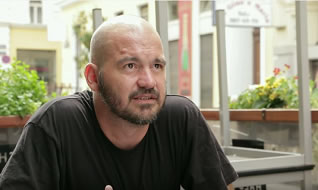
Thomas Glavinic (Graz, 2 april 1972)
De Amerikaanse schrijver, dichter en essayist Jay Parini werd geboren in Pittston op 2 april 1948. Zie ook alle tags voor Jay Parini op dit blog.
Below Zero
Ice petals on the trees.
The peppery black sparrows pour across
the frozen lawn.
The wind waits patiently behind the barn.
Though I’m not myself here, that’s okay.
I’ve lost my name,
my last address, the problem
that has kept me up all night this week in winter.
Such a long time coming,
this white timeless time in time,
with zero to the bone
the best thing anyone could ever say.
I stand here in the open,
full of straw, loose-limbed, unmuffled.
No one’s here, not-me as well,
this winter morning that goes on forever.
The Discipline of Seeing
How can you begin to say what’s here?
In north New Hampshire woods turn rough
with jack pine, scrub oak, thistle;
granite edges flake in sunlight,
and the dirt is sandy, roots
like old hands swelling at the knuckles.
Air is white, and lakes are bluer:
pieces of old sky that fell to earth.
The wind seems far too high today
as white pines rustle at enormous height,
a lofty, lush, deep•throated whir;
its broad effects are all on view,
if only you can train the eye to watch,
to focus properly on what presents
itself in time, in taste and color,
shapes that shift from hill to valley
and demand continuous transcription.
It is always difficult to hold,
to place a moving landscape in the mind,
where language feeds upon the given world.
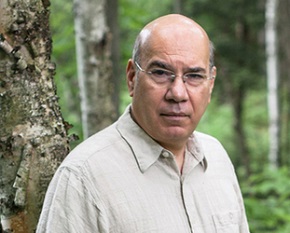
Jay Parini (Pittston, 2 april 1948)
De Amerikaanse dichter en letterkundige Ed Dorn werd geboren op 2 april 1929 in Villa Grove, Illinois. Zie ook alle tags voor Ed Dorn op dit blog.
The Price is Right: A Torture Wheel of Fortune
A B H O R E N C E S
November 13, 1984
The show did not start off
auspiciously, the contestants
were nervous and kept fiddling
with the wires attached
to their privates, the men
being especially anxious
over the question of balls.
The women were more querulous.
The first question, a medical subject,
was why had the anti-abortionists
not mentioned, let alone commented on,
the Baboon Heart transplant?
One terrified contestant guessed
it was because the moral majority’s
nervous concern with evolution
precluded their bringing it up.
That hopeful contestant’s face
reflected the malicious light
in the eyes of the host who
immediately threw the switch
A powerful surge shot through
the wires and both sexes screamed
and writhed, to the delight of
the vast viewership, estimated
at 100 million, all of whom,
presumably, were delighted
not to be on the show,
because not one in a million
knew the answer.
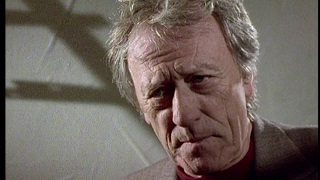
Ed Dorn (2 april 1929 – 10 december 1999)
De Franse schrijver Émile Zola werd geboren op 2 april 1840 te Parijs. Zie ook alle tags voor Émile Zola op dit blog.
Uit: La fortune des Rougon (Les Rougon-Macquart)
« Une des curiosités de ce champ était alors des poiriers aux bras tordus, aux nœuds monstrueux, dont pas une ménagère de Plassans n’aurait voulu cueillir les fruits énormes. Dans la ville, on parlait de ces fruits avec des grimaces de dégoût ; mais les gamins du faubourg n’avaient pas de ces délicatesses, et ils escaladaient la muraille, par bandes, le soir, au crépuscule, pour aller voler les poires, avant même qu’elles fussent mûres.
La vie ardente des herbes et des arbres eut bientôt dévoré toute la mort de l’ancien cimetière Saint-Mittre ; la pourriture humaine fut mangée avidement par les fleurs et les fruits, et il arriva qu’on ne sentit plus, en passant le long de ce cloaque, que les senteurs pénétrantes des giroflées sauvages. Ce fut l’affaire de quelques étés.
Vers ce temps, la ville songea à tirer parti de ce bien communal, qui dormait inutile. On abattit les murs longeant la route et l’impasse, on arracha les herbes et les poiriers. Puis on déménagea le cimetière. Le sol fut fouillé à plusieurs mètres, et l’on amoncela, dans un coin, les ossements que la terre voulut bien rendre. Pendant près d’un mois, les gamins, qui pleuraient les poiriers, jouèrent aux boules avec des crânes ; de mauvais plaisants pendirent, une nuit, des fémurs et des tibias à tous les cordons de sonnette de la ville. Ce scandale, dont Plassans garde encore le souvenir, ne cessa que le jour où l’on se décida à aller jeter le tas d’os au fond d’un trou creusé dans le nouveau cimetière. Mais, en province, les travaux se font avec une sage lenteur, et les habitants, durant une grande semaine, virent, de loin en loin, un seul tombereau transportant des débris humains, comme il aurait transporté des plâtras. Le pis était que ce tombereau devait traverser Plassans dans toute sa longueur, et que le mauvais pavé des rues lui faisait semer, à chaque cahot, des fragments d’os et des poignées de terre grasse. Pas la moindre cérémonie religieuse ; un charroi lent et brutal. Jamais ville ne fut plus écœurée.
Pendant plusieurs années, le terrain de l’ancien cimetière Saint-Mittre resta un objet d’épouvante. Ouvert à tous venants, sur le bord d’une grande route, il demeura désert, en proie de nouveau aux herbes folles. La ville, qui comptait sans doute le vendre, et y voir bâtir des maisons, ne dut pas trouver d’acquéreur ; peut-être le souvenir du tas d’os et de ce tombereau allant et venant par les rues, seul, avec le lourd entêtement d’un cauchemar, fit-il reculer les gens ; peut-être faut-il plutôt expliquer le fait par les paresses de la province, par cette répugnance qu’elle éprouve à détruire et à reconstruire..”
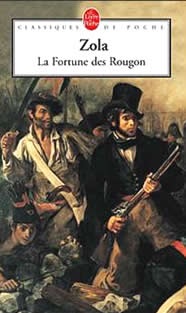
Émile Zola (2 april 1840 – 29 september 1902)
Cover
De joods-Hongaarse schrijver György Konrád werd geboren op 2 april 1933 in Berettyóújfalu (bij Debrecen). Zie ook alle tags voor György Konrád op dit blog.
Uit: The Case Worker (Vertaald doorPaul Aston)
“At the beginning of my career, I thought: It’s like swallowing fistfuls of mud; I can neither digest it nor vomit it up. IN the last ten years I must have said, “Have a seat, please,” thirty thousand times. Apart from colleagues, witnesses, informers, prying newspapermen, and a few inoffensive mental cases, it was distress that drove most of them to my desk. In most instances their anguish was massive, tentacular, and incurable; it weighed on me in this room where people cry, “Believe me, it hurts,” “I can’t go on,” and “It’s killing me,” as easily as they would scream on a roller coaster. ON the whole, my interrogations make me think of a surgeon who sews up his incision without removing the tumour.”
(…)
“I would merely wave a token farewell to the child, certain that the meaning of my gesture would not get through his vacuous gaze to his consciousness, and after shaking hands with the staff, hasten down the steps of the pillared portico to where the taxi driver, impatiently drumming his fingers on the half-open window of his car, would be waiting to take me back from this morgue, which humanitarianism had disguised as a home, to the city that tramples its misfits and castaways, the city where both of us have our jobs and families and friends capable of articulate speech, and where more or less efficient organizations segregate the untouchables, the maladjusted, the waste products of a society that maintains order by violence, from us free citizens with our inborn sense of duty: the sight of their repulsive existence must not be permitted to remind us that we and they might have anything in common.”
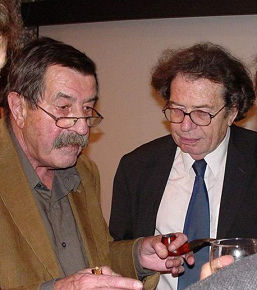
György Konrád (Berettyóújfalu, 2 april 1933)
Hier in 2000 met Günther Grass (links)
De Nederlandse dichteres en schrijfster Anneke Claus werd geboren op 2 april 1979 in Doetinchem. Zie ook alle tags voor Anneke Claus op dit blog.
Oude gelieven
er zijn nog brieven
die bij ’t eerste lezen
hen soms deden beven
maar nu na vele malen
als gebeden klinken
gesleten door het tij
aan de wand
een kolkende zee
die hij voor haar
en zij niet mooi
met halve woorden
spreken zij
en elke blik volstaat
en elke dag is weer
het einde van een feest
tussen de gevallen meubels
ligt het gesprek languit, voldaan
in rook en zoenen opgegaan.
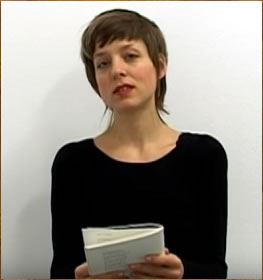
Anneke Claus (Doetinchem, 2 april 1979)
De Amerikaanse dichteres Anne Waldman werd geboren op 2 april 1945 in Millville, New Jersey. Zie ook alle tags voor Anne Waldman op dit blog.
Matriot Acts, Act I
you no longer believe in anything
movement of train, mauve waves
grammar’s anomie
gets you down or
war at the back and crown of head
PsyOps, o chicken little the sky! the sky!
o the fallen sky an edge of blue
hanging but
still breathing those colors?
a garden broken & restored many times
how often trying to leave it, bend away
words from that beautiful throat
listen or break or oscillate or
clamor as opposed to ‘read about’
could you be my model human being
up there on the dais?
o you, she…maybe he’s the one
& we came back from the cinema
glow behind our tears
and you saying a woman, a woman!
how tragic to be such slender thread of a woman
where was I being led?
more people thick in space
in constant motion
twisted around a clock
solar wind, solar heat, sociable matrix
it’s an atavistic mixed-up dream
and stirs the branches
high in Freedom Park
it was the voice of a desultory fragment
of speech now, talking about ‘state’ and ‘union’
how darkness turns at the wrist
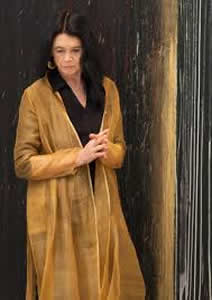
Anne Waldman (Millville, 2 april 1945)
Zie voor nog meer schrijvers van de 2e april ook mijn twee vorige blogs van vandaag.
